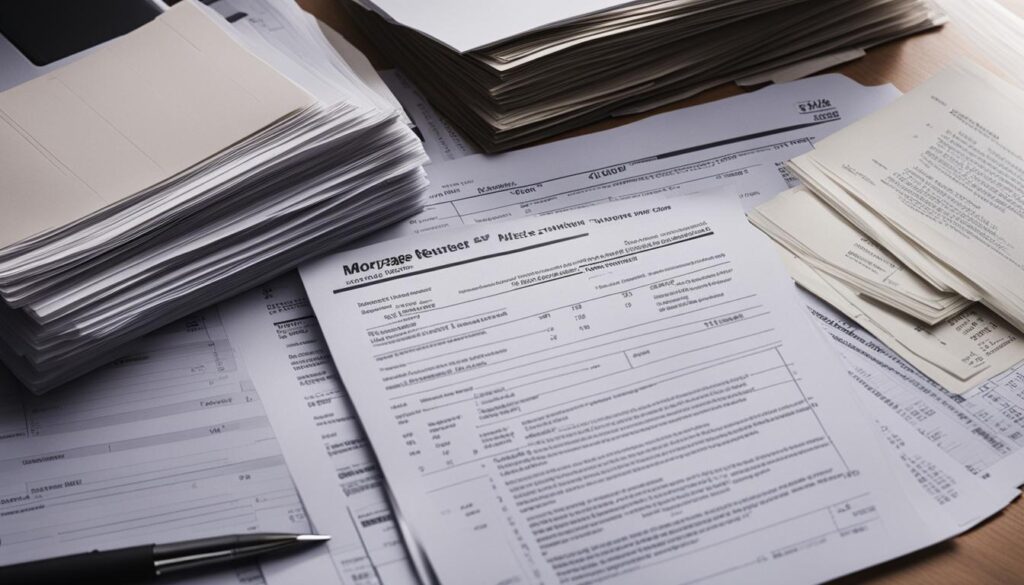If you’re planning to buy a home in 2023, you’re stepping into a potentially stressful process. The good news is that with the right mortgage tips, you can make the experience stress-free. Purchasing a home is a significant financial decision, and you need to be fully informed to make the best decisions.
Don’t worry, we’ve got you covered! Our team of experts has researched and compiled a detailed guide to help you navigate the mortgage journey. From understanding your mortgage options to getting pre-approved for a mortgage, we’ll provide you with tips and tricks to make the process hassle-free.
Key Takeaways
- Buying a home requires a lot of preparation and research.
- Understanding your mortgage options can help you make an informed decision.
- Saving for a down payment and improving your credit score can increase your chances of approval.
- Choosing the right lender is crucial in securing favorable rates and terms.
- Common mortgage mistakes can be avoided by staying informed and being aware of potential pitfalls.
Understanding Your Mortgage Options
When it comes to financing a new home, there are various mortgage options to consider. Before committing to one, it’s essential to have a clear understanding of each option and its distinct features. Here are the main types of mortgages that you can consider:
| Type of Mortgage | Features |
|---|---|
| Fixed-Rate Mortgage | A mortgage with a fixed interest rate for the entire term of the loan, typically ranging from 10 to 30 years. This offers predictable monthly payments and protection against interest rate increases. |
| Adjustable-Rate Mortgage (ARM) | A mortgage with an interest rate that can fluctuate over time, usually starting with lower rates for a certain introductory period (e.g., 5 years). This can result in lower initial payments but can be risky if rates increase after the initial period. |
| Federal Housing Administration (FHA) Loan | A government-backed loan with more flexible credit score requirements and lower down payment options (as low as 3.5%). However, FHA loans require mortgage insurance premiums and certain property restrictions. |
| Veterans Affairs (VA) Loan | A loan guaranteed by the Department of Veterans Affairs for eligible veterans, active-duty service members, and surviving spouses. VA loans typically offer no down payment and have more lenient credit requirements. |
| Jumbo Loan | A larger loan amount that exceeds the conforming loan limit set by Fannie Mae and Freddie Mac. Jumbo loans typically require higher credit scores, bigger down payments, and lower debt-to-income ratios. |
Understanding the different types of mortgages will allow you to choose the one that best fits your needs and financial situation. Consider your long-term goals, budget, and risk tolerance before making a decision.
Preparing Your Finances for a Mortgage
Taking steps to
prepare your finances
before applying for a mortgage can make a significant difference. Here are some tips to help you get started:
- Saving for a down payment: It’s recommended to save at least 20% of the home’s purchase price to avoid paying private mortgage insurance (PMI). Consider automating your savings, cutting back on unnecessary expenses, and looking for additional sources of income.
- Improving your credit score: Your credit score plays a vital role in determining your eligibility for a mortgage and your interest rates. Request a free credit report and check for errors. Pay your bills on time, keep your credit card balances low, and avoid opening new lines of credit.
- Organizing your financial documents: Lenders require extensive documentation during the mortgage application process. Gather your pay stubs, tax returns, bank statements, and any additional relevant paperwork. Keep them organized and easily accessible.
Remember, preparing your finances ahead of time can increase your chances of approval and improve the terms of your mortgage.

Choosing the Right Mortgage Lender
When it comes to choosing a mortgage lender, it’s important to do your research and find the best match for your needs. Some factors to consider when selecting a lender include:
- Interest rates and fees
- Loan programs offered
- Credit requirements
- Customer service reputation
You may also want to consult with a mortgage broker, who can provide access to multiple lenders and loan options to help you find the best fit for your situation.
When you’ve narrowed down your options, don’t hesitate to ask your potential lenders questions to ensure that you have a clear understanding of their loan terms and conditions. Be sure to compare loan estimates and evaluate each lender’s responsiveness and willingness to work with you throughout the entire process.
Getting Pre-Approved for a Mortgage
One way to give yourself a competitive edge when shopping for a home is to get pre-approved for a mortgage. This process involves a lender evaluating your credit, income, and other financial information to determine how much you can afford to borrow.
It’s important to understand the difference between pre-approval and pre-qualification. Pre-qualification is a preliminary assessment based on unverified information you provide to a lender, while pre-approval is a more thorough evaluation using verified data and documentation. A pre-approval letter gives you more leverage during negotiations and can speed up the home buying process.
Follow these tips to increase your chances of being pre-approved:
- Check your credit report and score and take steps to improve them if necessary
- Save for a down payment
- Organize your financial documents, including tax returns and bank statements
- Avoid making large purchases or opening new lines of credit before applying
Take the first step towards stress-free home buying by getting pre-approved for a mortgage.

“A pre-approval letter gives you more leverage during negotiations and can speed up the home buying process.”
Understanding Mortgage Interest Rates
Mortgage interest rates are a crucial factor to consider when choosing a loan. The interest rate affects the APR, which determines the total cost of borrowing money. Several factors can influence mortgage interest rates, including the lender’s policies, economic conditions, and the borrower’s creditworthiness. To secure favorable rates, it’s essential to research and compare lenders, maintain a good credit score, and lower your debt-to-income ratio.
The two primary types of mortgage interest rates are fixed-rate and adjustable-rate mortgages. A fixed-rate mortgage provides a stable interest rate, which means your monthly payments will remain the same throughout the loan’s term. In contrast, an adjustable-rate mortgage (ARM) has a fluctuating interest rate, which means your monthly payments can change over time. ARM loans typically have a lower initial interest rate, making them an attractive option for homebuyers who plan to stay in their home for a short period.
If you’re unsure which type of mortgage is best for you, consult with a financial advisor or a trusted mortgage professional. They can help you make an informed decision based on your financial goals and circumstances.
Comparison of Fixed-rate vs. Adjustable-rate mortgages
| Fixed-rate Mortgage | Adjustable-rate Mortgage |
|---|---|
| A stable interest rate that doesn’t change | An interest rate that varies over time |
| Monthly payments remain the same throughout the loan’s term | Monthly payments can fluctuate based on changes in the interest rate |
| Suitable for homebuyers who plan to stay in their home for a long time | Suitable for homebuyers who plan to sell or refinance their home before the adjustment period |
Ultimately, understanding mortgage interest rates is crucial to make informed decisions that align with your financial goals. Research, compare lenders, and consult with professionals to secure favorable rates and a mortgage that works for you.
Navigating the Mortgage Application Process
Now that you’ve chosen your lender and obtained pre-approval for your mortgage (as discussed in Section 5), it’s time to fill out the mortgage application. The application is a comprehensive document that requests detailed information about your finances and the property you want to purchase. To ensure a smooth application process, it’s important to have all the necessary documentation ready beforehand.
The documentation required for a mortgage application includes:
| Document | Description |
|---|---|
| Proof of income | This includes W-2 forms, pay stubs, and tax returns for at least the past two years to verify your employment and income. |
| Proof of assets | This includes bank statements, investment account statements, and any other assets you have that could be used to pay the mortgage. |
| Debt obligations | List all of your current debts, including credit card balances, car loans, and student loans. |
| Real estate contract | This is the contract between you and the seller and outlines the terms of the sale. |
| Property appraisal | This document shows the appraised value of the property. |
It’s important to note that additional documentation may be required based on your specific financial situation and the type of mortgage you’re applying for. Be sure to consult with your lender to determine any additional documents that may be necessary.
Once you’ve submitted your application with all the necessary documentation, your lender will begin processing your request. During this time, they may request additional information or clarification on certain documents. Be sure to promptly respond to any requests to avoid delays in the application process. With patience and attention to detail, you’ll be on your way to owning your dream home.

Understanding Closing Costs
When purchasing a home, it’s important to remember that closing costs can add up quickly. Closing costs are expenses in addition to the price of the property that buyers are required to pay at the time of the transaction.
These costs usually include fees from the lender, attorney, title company, document processing and other miscellaneous expenses. Homebuyers are responsible for covering these costs, which can vary depending on location and loan type.
If you’re preparing to buy a home, it’s important to understand what closing costs entail.
The Different Fees Involved in Closing Costs
| Expense Type | Description |
|---|---|
| Appraisal Fee | The cost of having the property professionally appraised to ensure its value |
| Credit Report Fee | The cost of obtaining a credit report from a credit reporting agency |
| Loan Origination Fee | The fee the lender charges for processing your loan application |
| Attorney Fee | The cost associated with hiring an attorney to review legal documents and oversee the closing process |
| Title Search and Insurance | The cost for the title company to research the property’s history and provide the necessary insurance policies |
| Property Tax and Insurance | The cost for prepaid taxes and insurance policies |
| Recording Fee | The cost of recording the deed and mortgage with the county clerk’s office |
| Homeowner Association (HOA) Fee | The cost of the HOA’s transfer and initiation fees, if applicable |
| Escrow Deposit | The cost to set up an escrow account to cover property taxes and insurance premiums |
Negotiating and Saving on Closing Costs
There are ways to reduce and negotiate closing costs. Negotiating with a lender or seller can result in lower costs, and shopping around for different service providers can also help secure better prices.
It’s important to review each item on the closing cost list and make sure you understand what you’re paying for.
Knowing what to expect from closing costs can help prepare you for the expenses you’ll face when closing on a home.
Avoiding Common Mortgage Mistakes
Even the most experienced homebuyers can fall prey to mortgage mistakes. Knowing which pitfalls to avoid can save you time and money in the long run. Below, we’ll outline some of the most common mortgage mistakes and how to steer clear of them.
Not Checking Your Credit Score
Your credit score plays a crucial role in determining your mortgage interest rate, so it’s essential to know your score before applying for a mortgage. Check your credit report for errors or issues that could impact your score and work on improving it if necessary.
Skipping Getting Pre-Approved
Getting pre-approved for a mortgage can give you an edge when house hunting and helps you stay within your budget. Skipping this crucial step could result in you falling for a home that you cannot afford.
Failing to Budget for Additional Costs
Aside from the mortgage payment, homebuyers must also budget for other expenses such as property taxes, insurance, and utilities. Not planning accordingly may cause a financial burden and hinder the enjoyment of the purchased home’s benefits.
Going Beyond Your Budget
It’s essential to calculate your budget for your mortgage payment carefully. Taking on a higher payment than you can manage can lead to missed payments, add pressure to regular expenses, and put your home’s ownership at risk.
Choosing the Wrong Mortgage
There are various types of mortgages available, so selecting the wrong one can cost you dearly. Consult with your mortgage lender to discover the right mortgage product to cater to your situation, income, and goals.
Not Reading the Fine Print
Ignorance of the fine print could lead to mistakes like ballooning interest rates, unexpected fees, or various lending terms. Dig into the mortgage terms, its extra fees, and the contract details such as the amortization period, payment frequency, payment structure, and prepayment options.

Forgoing a Home Inspection
A home inspection is crucial in identifying hidden property damage, which could cause significant financial stress. Before closing on a home, make sure to hire a licensed home inspector to identify any issues that could cause repair costs.
Conclusion
In conclusion, buying a home can be a daunting experience, but with these mortgage tips for 2023, you can navigate the process confidently and stress-free. By understanding your mortgage options, preparing your finances, and choosing the right lender, you can make informed decisions that align with your needs and budget.
Getting pre-approved for a mortgage and understanding interest rates can help you secure favorable terms and save money in the long run. Don’t forget to also navigate the application process carefully and negotiate closing costs to maximize your savings.
Lastly, be sure to avoid common mortgage mistakes such as taking on too much debt or skipping an inspection. By following these tips and staying informed, you can become a successful homeowner in no time. Good luck!
FAQ
What are some mortgage tips for stress-free home buying in 2023?
In 2023, you can make your home buying experience stress-free by following some valuable mortgage tips. These tips will help you navigate the process with confidence and provide savvy financing advice to ensure a smooth transaction.
What are the different mortgage options available to me?
Before starting the home buying process, it’s important to understand the various mortgage options you have. There are different types of mortgages with unique features, and we will break them down for you, allowing you to make an informed decision about the best fit for your needs.
How can I prepare my finances for a mortgage?
Preparing your finances before applying for a mortgage can significantly impact your chances of approval. We will provide you with tips on saving for a down payment, improving your credit score, and organizing your financial documents to increase your chances of success.
How do I choose the right mortgage lender?
The mortgage lender you choose can have a significant impact on your home buying experience. We will discuss the factors you should consider when selecting a mortgage lender and provide tips to help you find the best match for your specific needs.
How can I get pre-approved for a mortgage?
Getting pre-approved for a mortgage can give you a competitive edge in the housing market. We will guide you through the pre-approval process, explain the difference between pre-approval and pre-qualification, and offer tips to increase your chances of approval.
How do mortgage interest rates work?
Mortgage interest rates play a crucial role in determining the affordability of your loan. We will explain the factors that influence interest rates, clarify the difference between fixed-rate and adjustable-rate mortgages, and provide guidance on how to secure favorable rates.
What is involved in the mortgage application process?
Applying for a mortgage involves several steps and requires specific documentation. We will walk you through the mortgage application process, outlining the necessary paperwork and highlighting potential pitfalls to avoid along the way.
What should I know about closing costs?
Closing costs can quickly add up when buying a home. We will explain what closing costs entail, break down the different fees involved, and offer tips on how to negotiate and save money during this stage of the home buying process.
What are common mortgage mistakes to avoid?
To ensure a smooth mortgage journey, it’s important to be aware of common mistakes that borrowers make. We will highlight some of the most common mortgage pitfalls and provide guidance on how to avoid them, saving you time, money, and unnecessary stress.

[url=https://doxycycline.cfd/]doxycycline over the counter drug[/url]
Super, fantastic
Incredible, well done
linetogel
wow, amazing
Brilliant content
Impressive, congrats
wow, amazing
Excellent effort
nice content!nice history!! boba 😀